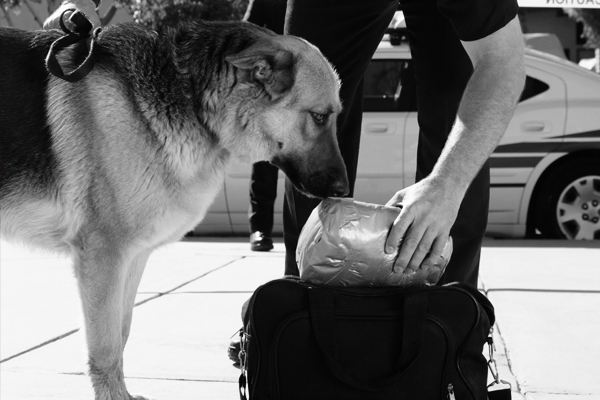Drug cases can be remarkably complex, and that’s one of the reasons why you really need to get an experienced Arizona drug attorney, to help you succeed your case. Drug traffic stop and search cases could be especially complicated. If you have been arrested for drugs when traveling and a drug sniffing dog was involved, you have to know what rules and regulations officers need to follow.
Reasonable Suspicion in Traffic Stops
Right before searching a motor vehicle, the police officer must certainly have what is determined as probable cause, meaning that their opinion that a crime has occurred should be backed by proof. The evidence would be physical, details from witnesses, or the officer’s own observations, but must go further than simple suspicion. As a matter of fact, the first hearing is referred to as “probable cause hearing,” and is particularly made to examine the evidence for any probable cause scenarios.
In these proceedings, it will be validated if the policeman had probable cause, the belief that a crime transpired or was taking place, or reasonable suspicion, giving the officer the right to apprehend and inspect the suspect. But actually, neither probable cause nor reasonable suspicion is needed to call for a drug sniffing dog to the scene during a basic traffic stop. This was established by the Supreme Court in Illinois v. Caballes, where Roy Caballes was pulled over for speeding and consequently arrested for marijuana trafficking shortly after a drug dog was brought to the scene and alerted on his vehicle.
In a 6-2 ruling, the Court favored the state, with Justice John Paul Stevens writing that drug sniffing canine searches did not breach Fourth Amendment rights. He really felt that the expectation of privacy did not extend to illegal narcotics. In this case, any good signal may be considered probable cause to do a search. If the drug canine signals that it smells drugs, the arresting officer then has probable cause to execute a search.
You do, nonetheless, have some defense in this scenario; for example, an officer cannot detain you indefinitely, or even for an unreasonable period of time while waiting for the drug canine to come. Generally speaking, if the arresting policeman cannot pull off the drug dog to the scene in the time it takes to run your tags and write a ticket, the utilization of the dog becomes constitutionally suspect.
So if you are pulled over and the policeman threatens to call in the K-9 unit, you are not obliged to say yes to searches. While waiting on the canine to appear, you have the right to establish if it is appropriate for you to leave by directly asking if you are free to go. If the officer says no and goes ahead to detain you until the canines appear, you have the right to remain silent and proceed to choose not to consent to a dog sniff, even though the policeman says you must consent.
You should be mindful that opening your vehicle for the policeman or turning over your keys is the same as consent. If a judge decides that the officer had no reason to detain you, any evidence found by drug canine can be thrown out in court.
The Reliability of Drug Sniffing Dogs
Dogs have been used by human beings for their extraordinary sense of smell, as their noses have more than 200 million receptors (compared to the 10 million humans possess). Several breeds even have the impressive ability to recognize specific scents of things which are entirely submerged in water, which is very beneficial for law enforcement since drug smugglers frequently try and hide the smell of drugs with some other substance.
This is not to say that a dog’s sense of smell is infallible, and the accuracy of many a drug-sniffing dog has cast doubt in court. The American Society of Canine Trainers (ASCT) even admits to the shockingly low accuracy rates of drug sniffing dogs, pointing out averages as low as 62% (Currency Searches, 2015).
There are plenty of reasons and variables for this dreadfully poor accuracy rate. Sometimes a trained drug dog’s nose is too strong, and may lead to the detection of trace scents left behind by drugs which are actually no longer present. It should also be taken into consideration that there is a considerable difference between what a dog can do, versus what a dog actually does. What the dog actually does is almost completely dependent on the training received, for which there are no required national standards for certification. Furthermore, despite how effective or ineffective a dog may really be, it is competent of acting on its own behalf and consequently, it may be almost impossible to confirm the inclination for any particular response.
Surely we would like to believe that these creatures are selfless and committed to satisfying their handlers, yet that in itself could be problematic. Dog handlers can unintentionally cue alerts from their dogs by leading them too slowly or too many times around a car.
Contact Arizona Drug Attorney
Never assume that just because police are in a position of power, they are always right and just. If you feel you were subjected to an unlawful drug search, you deserve to have the matter examined by a skilled and established Arizona drug lawyer.
Recent Posts
- Morgan County jailer charged with drug trafficking
- Murray Bridge woman charged for trafficking ice
- How To Get The Best Interstate Drug Trafficking Lawyer in Santa Cruz County AZ
- How To Get The Best Interstate Drug Trafficking Lawyer in Apache County AZ
- How To Get The Best Interstate Drug Trafficking Lawyer in Maricopa AZ

